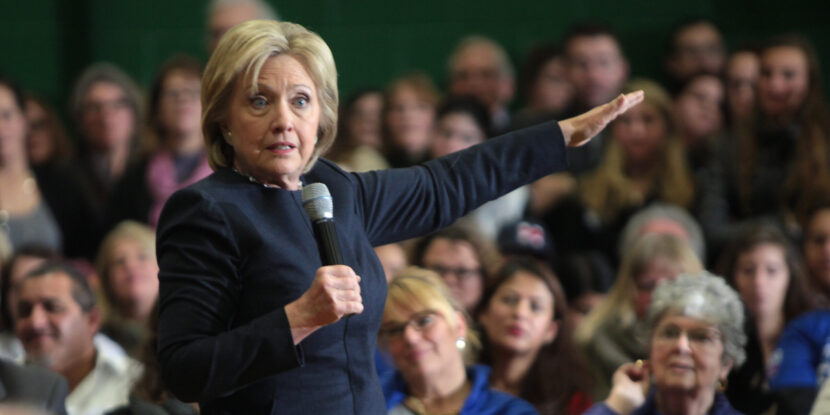
PULSE POINTS:
❓What Happened: Former Clinton administration military aide Buzz Patterson accused Hillary Clinton of fostering a hostile environment in the White House, describing her as “evil” and “vindictive.”
👥 Who’s Involved: Buzz Patterson, a former Air Force officer and Senior Military Aide to President Bill Clinton, and Hillary Clinton.
Your free, daily feed from The National Pulse.
📍 Where & When: White House, during Bill Clinton’s presidency (1996-1998), with the revelations posted to X (formerly Twitter) on Saturday, March 17, 2025.
💬 Key Quote: “When Hillary was gone, it was a frat party. When she was home, it was Schindler’s List,” wrote Patterson.
⚠️ Impact: Patterson notes that the mood and tone of the White House often revolved around whether Hillary Clinton was present on that given day, claiming that the political staff and the Clintons themselves were known for their “lack of professionalism and courtesy.”
IN FULL:
A former military aide to President Bill Clinton has alleged that Hillary Clinton was so feared during her time as First Lady that White House staff avoided her at all costs. Buzz Patterson, who served as Senior Military Aide from 1996 to 1998, made the claims in a series of posts on X (formerly Twitter), describing Hillary Clinton as “evil, vindictive, profane,” and “a bitch.”
Patterson, who carried the “nuclear football” for the president, stated that the atmosphere in the White House shifted dramatically based on Hillary Clinton’s presence. “We used to say that when Hillary was gone, it was a frat party. When she was home, it was Schindler’s List,” he wrote in a post that has garnered millions of views.
He claimed that Hillary Clinton was the most intimidating figure in the administration, even more so than her husband. Patterson recalled being warned by his predecessor, “You can get away with pissing off Bill, but if you make her mad, she’ll rip your heart out.”
According to Patterson, the First Lady instructed staff to avoid interacting with her, leading to scenes of White House employees scrambling to stay out of her line of sight. “Many a time, I’d see mature, professional adults… scurrying into office doorways to escape Hillary’s line of sight,” he recounted, likening her demeanor to that of a “Nazi schoolmarm.”
Patterson also alleged that Hillary Clinton attempted to ban military uniforms in the White House, a move he opposed due to national security concerns. He claimed she sought to downplay the military’s importance in the administration, only relenting after the Secret Service intervened.
The former aide, who has since become a vocal supporter of President Donald J. Trump, concluded his posts by saying the Clintons are “corrupt beyond words.”

PULSE POINTS:
❓What Happened: After voting down the budget reconciliation bill on Friday, House Budget Committee members reconvened on Sunday after renewed negotiations and intervention from President Donald J. Trump and the White House, allowing the legislation to advance to the Rules Committee before it heads to the House floor.
👥 Who’s Involved: Speaker Mike Johnson, President Donald J. Trump, House Budget Committee members, and four GOP members who shifted their stance: Reps. Chip Roy, Ralph Norman, Andrew Clyde, and Josh Brecheen.
Your free, daily feed from The National Pulse.
📍 Where & When: Capitol Hill, late Sunday night vote following a failed attempt on Friday.
💬 Key Quote: Speaker Mike Johnson said the bill is now “on track” for a House floor vote by the end of the week.
⚠️ Impact: The bill’s advancement is a win for Trump and Johnson but faces further hurdles in the House and Senate.
IN FULL:
House Republicans on the Budget Committee narrowly advanced a major budget proposal on Sunday night, reversing Friday’s failed attempt to move the bill forward. The measure, which includes making President Donald J. Trump’s 2017 tax cuts permanent, a significant expansion in the number of U.S. Immigration and Customs Enforcement (ICE) deportation agents, $1.6 trillion in deficit reduction, full Defense Department (DoD) funding, and overhauling Medicaid, passed by a 17-16 vote. All Democrats opposed the bill, while four Republicans—Reps. Chip Roy (R-TX), Ralph Norman (R-SC), Andrew Clyde (R-GA), and Josh Brecheen (R-OK)—voted “present” after initially voting “no” on Friday.
The sudden shift followed a weekend of intense negotiations behind closed doors. Speaker Mike Johnson (R-LA) met with lawmakers shortly before the vote and confirmed that “some minor modifications” had been made to the legislation. Johnson expressed optimism about the bill’s progress, stating it is “on track” for a House floor vote by the end of the week.
Budget Committee Chair Jodey Arrington (R-TX) noted during the session that additional changes to the measure are likely before it reaches the floor, though he declined to provide specifics. The bill must still pass through the House Rules Committee and secure approval on the House floor, where Republicans hold a slim majority.
Norman, one of the Republicans who shifted his stance, expressed enthusiasm about the adjustments, saying he was “excited about the changes” being made. However, the legislation remains contentious within the GOP, particularly over Medicaid reform. Conservatives have pushed for deeper structural changes, while moderates have raised concerns about the potential political risks.
Additionally, the legislation faces opposition from a bloc of moderate Republicans that represent districts in high-tax, Democrat-controlled states. President Trump and House Republican leaders have been engaged in protracted negotiations with these lawmakers, which include Reps. Elise Stefanik (R-NY), Mike Lawler (R-NY), Nick LaLota (R-NY), and Andrew Garbarino (R-NY). These lawmakers want a significant change to the State and Local Tax (SALT) deduction cap, well above the $30,000 for single filers and $60,000 for joint filers proposed by Speaker Johnson. Currently, House leaders are floating lifting the cap to $40,000 for single filers and $80,000 for joint filers—still below the $60,000 and $120,000 levels being pushed for by the New York Republican delegation.
Even if the package clears the House, Senate Republicans are expected to propose revisions. A group of Senate fiscal hawks, including Senator Mike Lee (R-UT), has expressed their intention to push for deeper structural cuts to reduce the budget deficit.
show less

 1 month ago
1
1 month ago
1








 English (US) ·
English (US) ·